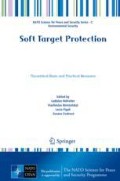Abstract
Consideration was given to the risks relating to the threat of chemical terrorism at the institutions of education. It is shown that the threat of chemical terrorism tends to the aggravation due to the social tension in the world. A detailed list of the options of access to highly toxic substances has been given. The most probable options of access are the theft of substances at the factories, use of toxic pesticides, manufacture of private small-size plants to synthesize toxic substances, use of natural poisons and toxins, theft at the storage sites of toxic substances or procurement and stealing from chemical industry companies and army deports. It is established that the most probable ways of carrying out the acts of terrorism using toxic substances are the blowing up of vessels containing highly volatile and nonvolatile toxic substances, leaving the vessels with easily volatile substances and spraying the aerosols of toxic substances. Special consideration was given to the risks that arise when chemical substances are used at the institutions of education. Special attention should also be paid to psychological aspects when training the personnel to enable a fast evacuation of the people from the impact zone, including the planning of evacuation events, preparing temporary shelters for the personnel, and detailed coordination of civil defense units inside the organization interacting with central civil defense bodies including the chemical survey management and the arrangement of radiation and chemical hazard monitoring posts with the on-line determination of the type of toxic substances.
Access this chapter
Tax calculation will be finalised at checkout
Purchases are for personal use only
References
Ganesan K, Raza SK, Vijayaraghavan R (2010) Chemical warfare agents. J Pharm Bioallied Sci 2(3):166–178
Leiv KS (2018) How to curb production of chemical weapons. Nature 556:293–295
Chauhana S, Chauhanb S, D’Cruzf R, Faruqic S, Singhd KK, Varmae S, Singha M, Karthike V (2008) Chemical warfare agents. Environ Toxicol Pharmacol 26(2):113–122
Kim K, Tsay OG, Atwood DA, Churchill DG (2011) Destruction and detection of chemical warfare agents. Chem Rev 111(9):5345–5403
Singh B, Prasad GK, Pandey KS, Vijayaraghavan R (2010) Decontamination of chemical warfare agents. Def Sci J 60(4):428–441
Author information
Authors and Affiliations
Corresponding author
Editor information
Editors and Affiliations
Rights and permissions
Copyright information
© 2020 Springer Nature B.V.
About this paper
Cite this paper
Hanna, P., Alexei, P. (2020). Threats of Chemical Terrorism in Educational Organizations. In: Hofreiter, L., Berezutskyi, V., Figuli, L., Zvaková, Z. (eds) Soft Target Protection. NATO Science for Peace and Security Series C: Environmental Security. Springer, Dordrecht. https://doi.org/10.1007/978-94-024-1755-5_25
Download citation
DOI: https://doi.org/10.1007/978-94-024-1755-5_25
Published:
Publisher Name: Springer, Dordrecht
Print ISBN: 978-94-024-1754-8
Online ISBN: 978-94-024-1755-5
eBook Packages: Economics and FinanceEconomics and Finance (R0)

